From the outset of independence, the Iraqi Army swiftly set about straightening Iraq's backbone, roving across the new borders of the state with demonstrations of force. The new country's Sunni-led government crushed uprisings led by Kurds, Yezidis, and Shi'a tribes. In 1933, three thousand Assyrians were massacred in a series of rampages as the nascent Iraqi army slaughtered their way through villages in the north. The military quickly emerged as the only institution capable of cohering the country, and violence became the principal ideal of Iraqi governance.
The belief that Iraq was an Arab state -- and that its citizens should either become Arab or be punished for not being so -- became the guiding principle of social control. Groups within Iraq but not loyal to its rulers have long been construed as fifth columns: the Shi'a, for their allegiances to Iran; the Assyrians, for the assertion of their indigenous ethnicity, their ties to the British, and their ambitions for autonomy; the Kurds, for placing their own interests above those of the state; and the Jews, for participating in the international Zionist conspiracy.
"...an Iraqi people does not yet exist; what we have is throngs of human beings lacking any national consciousness of sense of unity, immersed in religious superstition and traditions, receptive to evil, inclined towards anarchy and always prepared to rise up against any government whatsoever. I have begun with the army because I consider it to be the backbone for the creation of the nation." -- King Faisal I, 1932.
The militarization of Iraqi politics led to an extensive history of coups and counter-coups; Saddam Hussein took over in 1979 after a few more. Saddam's Ba'ath regime hailed the resurgence and unity of a superior ancient race (the Arabs); pursued the righting of wrongs suffered under foreign influence (e.g., the annexation of Kuwait); exhibited ruthless disdain for all other forms of political organization, especially communism; and was profoundly anti-Semitic. Non-Arabs were expelled from ethnically mixed areas, largely in the north, their property seized and destroyed, and replaced with Arabs. The Kurds were eventually targeted for annihilation.
Following the toppling of the Ba'ath regime in 2003, western state-crafters largely turned to exiles to run the country. Many of these men had been banished from Iraq by Saddam when they were young for opposing his rule, and spent the subsequent decades in states of paranoia and intellectual stagnancy. The scene was set for them to unleash their blinkered partisanship and aggrieved sense of righteous destiny into the new Iraq.
The leaders of the Iraqi Governing Council, the transitional authority from 2003--4, began de-Ba'athification, which saw prominent officials and thousands of rank-and-file employees loyal to Saddam removed from office and barred from participation in the new Iraq. Under the auspices of Paul Bremer, the American architect of the occupation, the core of the state was gutted. The returning exiles atomized the Sunni presence in Iraq -- in 1922, a year after Iraq was created as a League of Nations mandate, not a single Shi'a was in its provincial government; by 2006, as ethnic violence tore Baghdad apart, only one out of fifty-one members of its provincial council was Sunni.
One of the central tasks of Nouri al-Maliki, Iraq's Shi'a Prime Minister from 2006 to 2014, was to rebuild a national army. But he refused to integrate the Sahwa militia -- a popular Sunni force that had subdued al Qaeda in Iraq -- fearing a loss of influence over the security forces, and filled the army's ranks with Shi'a loyal to him. Maliki had Sunni leaders imprisoned and executed, accusing them of perfidy and sundry crimes, and invoking the de-Ba'athification laws, which could be applied in a highly elastic manner to marginalize or persecute nearly anyone.
Today, preachers foment vicious sectarianism on the streets of Baghdad, directing the alienation and suffering of Iraqis towards perpetual righteous fury. Sunni jihadist groups target the Shi'a population and mosques with waves of car and suicide bombings. Shi'a symbols -- images of Ali, the al-Sadr family -- are publicly displayed as if those of the state, and Shi'a nasheed -- jihad hymns -- blare out of government buses. The Mahdi Army, a death squad loyal to the Shi'a demagogue, Muqtada al-Sadr, set about ridding entire Baghdad neighborhoods of Sunnis. There are several maps depicting this demographic cleaving -- one includes Christian neighborhoods -- but the most important ones show the crucial decline of mixed neighborhoods.
Iraqi leaders have woven the country's narratives around their hatred for one another. Their tussle for control over communities and the country has come at the expense of both. For Iraq's smaller peoples -- such as Mandaeans, black Iraqis, Assyrians, and Yezidis -- this brutalization has taken a disproportionate toll.
The Mandaeans practice an ancient gnostic religion. Their name comes from the Aramaic for "knowledge." (They are also known as Sabians -- the root of which, sba, is Syriac for plunge or bathe -- in reference to the central place of baptism in their religious culture). Submersion into water is not merely a sacrament, as in Christianity, but a rite that accompanies the majority of Mandaean rituals, including marriage and preparation for death. Ancient inhabitants of southern Mesopotamia, they have largely been confined to the marshes, channels, and deltas of Khuzestan and Basrah with successive persecutions.
Mandaeans have their own language and scripture, which is close to the dialect of the Babylonian Talmud. Their alphabet adds two letters to the twenty-two usually found in Aramaic. Alap (written with a circular glyph) begins and concludes their alphabet, signaling the wholeness of the twenty-four hours and the perfection and completeness of the universe. They were silver and goldsmiths, and in the twentieth century, many moved to Baghdad and became doctors and pharmacists.
There were sixty to seventy thousand Mandaeans on the eve of the US-led invasion of Iraq in 2003; following waves of kidnapping, rape and murder, only a few thousand remain. Knowledge of their faith and written language is confined to their priesthood, and the clergy is dwindling. Their diaspora threatens the continuity of their traditions: Sabian architecture -- manda -- must be built on flowing ("living") water, which serves as their sacred space. This is often a problem in the various major western cities in which Mandaeans seek asylum, and where water is too dirty to be used for rituals. For Mandaeans, water is a symbol of God: the source of wisdom, birth and renewal in the universe. Their communal severance from it is a symbol of their disappearance.
Iraq has a significant population of black African descent, concentrated mainly around Basra -- a predominantly Shi'a province that produces significant amounts of Iraq's oil, near the ports settled in waves across centuries of slave trading. Many still practice aspects of the heritage they brought with them, from healing and mourning rituals to spirit summoning and African dances and instruments. Like African-American slaves, they built cities, staffed the homes of the rich, and worked on plantations and farms. There is even a parallel controversy over the word Arab Iraqis use to term them -- Abd, slave or servant -- the modern, casual deployment of which speaks to an ongoing legacy of racial inferiority. No black Iraqi has ever attained a government position; most work menial jobs, washing cars or providing local private security for businesses.
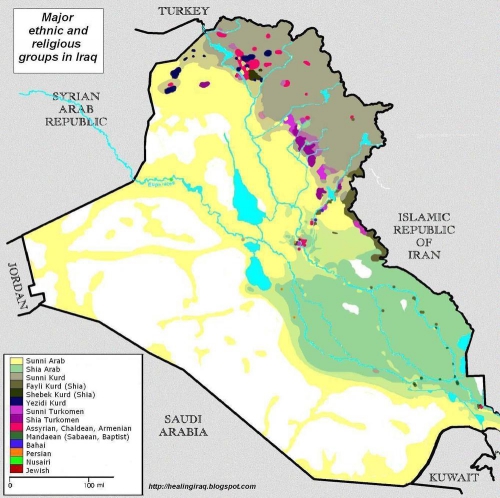
Black Iraqis do not have their own ethnic quota in Parliament, unlike almost all other ethnic and religious groups in Iraq. Come election time, Sunni and Shi'a parties lure them with bribes and gifts in exchange for oaths swearing allegiance to Allah. Inspired by the Civil Rights Movement and further emboldened by the election of Barack Obama, black Iraqi community leaders tried to mobilize their communities. Jalal Diyab, founder of the Free Iraqi Movement, lobbied to get black Iraqis on provincial councils -- and most significantly, he sought to have blacks represented as a discrete ethnic block in Parliament, where they have never had a representative. He was shot dead on April 26, 2013. No investigation into his murder took place, and the other candidates of the Free Iraqi Movement withdrew from the local council elections.
Assyrians trace their heritage to the ancient Assyrian civilization, which also encompassed the state of Babylonia in today's central and southern Iraq. They became some of the earliest Christians, and navigated life under the Persian and Islamic Arab Empires. Following the devastating Mongol sweep across Asia in the thirteenth century, the Assyrians were largely confined to the mountains of northern Mesopotamia and the plains that stretched out from them. When their bid for autonomy failed, the Assyrians of the Hakkâri mountains (in today's south-east Turkey) were expelled from their highland redoubts. Turks attempting to create an ethno-religiously pure Republic killed every Christian they could find, including around three hundred thousand Assyrians, between 1914 and 1923.
The surviving Assyrians marched, starved and ravaged, towards uncertain futures across the region and beyond. Most ended up concentrated within Iraq, scattered across refugee camps and exposed to further depredation. Iraq celebrated its independence by massacring three thousand Assyrians in and around the village of Simele in 1933, an exhibition of how the state planned to treat the potentially disloyal. Crowds in Baghdad greeted the returning army by garlanding them with flowers and rose water.
But the violence of the early decades of the century left a permanent legacy. The Patriarch of the Chaldean Church, a Catholic offshoot of the Church of the East, and a bishop of the Syriac Orthodox Church in Iraq wrote to King Faisal, probably under duress, congratulating him on the "peace" yielded by the massacre. The Church of the East Patriarch, Mar Shimun, was exiled from Iraq in 1933.
Saddam let the Assyrians be Christians as long as they exchanged everything else about themselves for the privilege of worship. Assyrian civil organizations, media outlets, and clubs and societies were outlawed by the mid-seventies. The modern Assyrian language -- the morphology of which is partly rooted in the Akkadian language of the ancient Assyrians -- was restricted to the home. Ancient Assyrian figures were depicted as early Iraqi Arabs, undermining Assyrian claims to an indigenous, non-Arab ethnicity.
Catholic schools taught their pupils in Arabic rather than Assyrian; one of the men closest to Saddam was a Chaldean Catholic who Arabized his name from Mikhail Yuhanna to Tariq Aziz. When Saddam was still feted by America, he was handed the key to the city of Detroit after donating two hundred and fifty thousand dollars to a Chaldean Church (whose reverend had publicly congratulated the dictator on his ascent to power).
Jockeying for a piece of influence was a mainstay of life under Arabist totalitarianism -- with the lid of tyranny lifted, preachers, bishops and imams pulled apart the strains of ethnicities and congregations. In 2003, in the run-up to the U.S. invasion, the influential Chaldean bishop Sarhad Jammo wrote a letter to Paul Bremer describing the grouping of Chaldeans with Assyrians -- in fact ethnically indistinguishable save for sect -- as "an injustice against our people" and demanded that they be recognized as a separate ethnic group, despite previous claims to the contrary.
 Since 2003, Assyrians have been the targeted victims of the whole spectrum of atrocity. More than seventy churches across Iraq have been attacked or destroyed. Entire neighborhoods have been emptied of their residents following episodes of rape, murder, and intimidation deliberately fashioned to purge Iraq of Christianity. A pre-2003 population of around 1.2 million mainly ethnically Assyrian Christians in Iraq has dropped to four hundred thousand.
Since 2003, Assyrians have been the targeted victims of the whole spectrum of atrocity. More than seventy churches across Iraq have been attacked or destroyed. Entire neighborhoods have been emptied of their residents following episodes of rape, murder, and intimidation deliberately fashioned to purge Iraq of Christianity. A pre-2003 population of around 1.2 million mainly ethnically Assyrian Christians in Iraq has dropped to four hundred thousand.
All of the poisonous movements in Iraqi politics conspired in June of 2014, when Mosul -- Iraq's second city -- fell to ISIS. Mosul, a largely Sunni city that was historically a hub of mercantile comingling, had been plagued by the Sunni insurgency since the collapse of central authority in Iraq in 2003. Racketeers funded jihadi activity by theft and extortion; dozens of teachers, professors, and other educated people were killed or expelled; clergy were abducted and executed. Suicide bombers targeted administrative and government institutions. Three weeks after the capture of Mosul, the groundwork was laid for the declaration of an Islamic Caliphate.
Following the full withdrawal of US troops from Iraq in 2011, the expression of Baghdad's insecurities towards Sunnis intensified. On paper, the Iraqi army in Mosul outnumbered the invading ISIS fighters by at least ten to one. But the largely Shi'a government forces were deeply resented by their charges, who perceived them as occupiers loyal to a remote and repressive state dedicated to sectarian persecution and marginalization.
The army in and around Mosul had extraordinary organizational and operational problems -- poor training, dilapidated structures, failures of payment, "ghost" divisions, and corruption so endemic that soldiers would often bribe their superiors to abdicate duty. So what, and who, was the army fighting for? For Iraq's political class and the Army officials tied to it, Mosul was not a city worth risking lives for; it fell with barely a shot fired. Souvenirs of the Iraq that its protectors had shed -- badges, flags, uniforms -- littered the ground. The jihadists treated themselves to a harvest of their desertion, reaping the Humvees, ordnance, tanks, weapons and bullets that America had endowed Iraq with, using them to carve their way into the state the machinery was purchased to defend.
A few weeks into the Islamic State's occupation of Mosul, it tagged Christian property with "N" for Nassarah, the Quranic term for Christian, and Property of the Islamic State. Christians were told by decree on Friday, June 18th, that they had a day to decide whether to convert to Islam, live as Dhimmi, a subjugated rank afforded to some non-Muslims under a Caliphate, or flee. All but those who were too old or infirm to leave fled. They were robbed of all they owned, down to identification papers, pension books, and babies' earrings. All forty-five Christian establishments in Mos
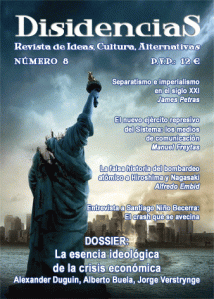



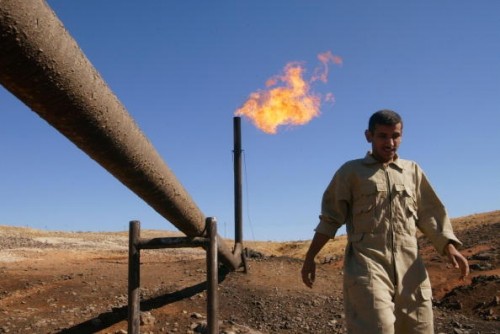

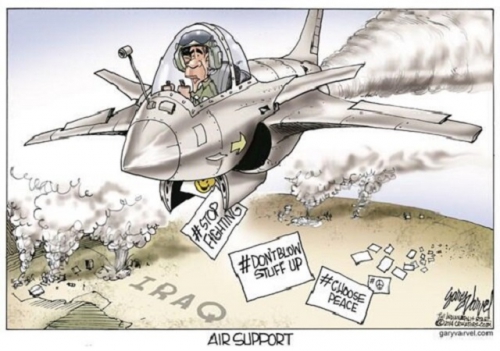
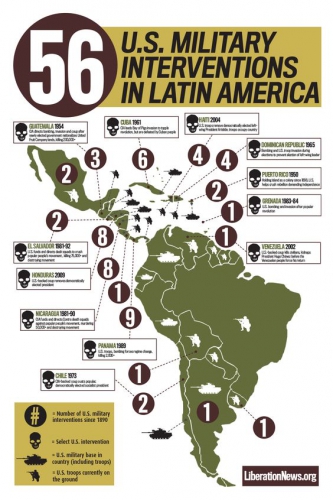 Nevertheless, anti-intervention does not necessarily mean anti-war when war becomes the only option to protect vital interests, but armed conflict cannot be entered into lightly. There is in fact a simple answer to when to use force: it is to defend the United States itself against a clearly defined threat to the country or to a genuine vital interest. Indeed, unless a vital interest is threatened the US has no right to intervene anywhere. And how to use force is also simple: it is up to Congress to declare war as required by the Constitution. But the Constitution of the United States did not envision major deployments of American soldiers, sailors, Marines and airmen overseas, nor did it consider the existence of more than 1,000 military bases worldwide. Indeed, the US has not faced a domestic armed threat since Pancho Villa raided New Mexico in 1916, so it is necessary to consider war-making in a contemporary context.
Nevertheless, anti-intervention does not necessarily mean anti-war when war becomes the only option to protect vital interests, but armed conflict cannot be entered into lightly. There is in fact a simple answer to when to use force: it is to defend the United States itself against a clearly defined threat to the country or to a genuine vital interest. Indeed, unless a vital interest is threatened the US has no right to intervene anywhere. And how to use force is also simple: it is up to Congress to declare war as required by the Constitution. But the Constitution of the United States did not envision major deployments of American soldiers, sailors, Marines and airmen overseas, nor did it consider the existence of more than 1,000 military bases worldwide. Indeed, the US has not faced a domestic armed threat since Pancho Villa raided New Mexico in 1916, so it is necessary to consider war-making in a contemporary context.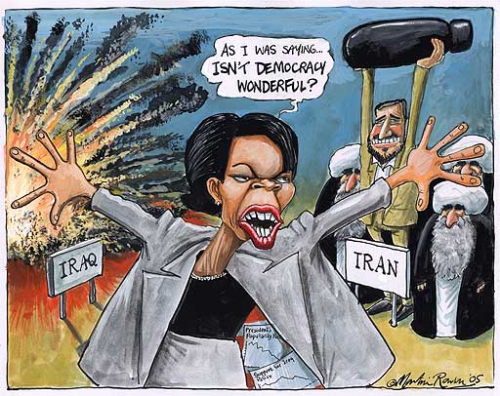


 Interrogé dans le Libre Journal d’Emmanuel Ratier sur Radio Courtoisie, le professeur de géopolitique des officiers supérieurs de l'Armée française a déclaré qu'il n'adhérait pas aux théories alternatives sur le 11 septembre. Néanmoins, dans le cadre de son ouvrage sur le choc des civilisations, il avait estimé que ces théories, scientifiquement intéressantes, avaient leur place. De plus, en tant qu'analyste, il se permet librement de douter du rapport officiel américain sur les attentats, doute qui ne le fait toutefois pas adhérer aux théories pour lesquelles il a été brutalement exclu. Il fait remarquer que les Américains sont capables de mentir pour arriver à leurs fins, comme l'a montré la fausse accusation à l'égard de l'Irak de Saddam Hussein concernant les armes de destructions massives. En outre, il rappelle qu'aux Etats-Unis, ce débat est ouvert et libre. Et de constater, mais on le savait, que la liberté d'expression n'existe plus en France.
Interrogé dans le Libre Journal d’Emmanuel Ratier sur Radio Courtoisie, le professeur de géopolitique des officiers supérieurs de l'Armée française a déclaré qu'il n'adhérait pas aux théories alternatives sur le 11 septembre. Néanmoins, dans le cadre de son ouvrage sur le choc des civilisations, il avait estimé que ces théories, scientifiquement intéressantes, avaient leur place. De plus, en tant qu'analyste, il se permet librement de douter du rapport officiel américain sur les attentats, doute qui ne le fait toutefois pas adhérer aux théories pour lesquelles il a été brutalement exclu. Il fait remarquer que les Américains sont capables de mentir pour arriver à leurs fins, comme l'a montré la fausse accusation à l'égard de l'Irak de Saddam Hussein concernant les armes de destructions massives. En outre, il rappelle qu'aux Etats-Unis, ce débat est ouvert et libre. Et de constater, mais on le savait, que la liberté d'expression n'existe plus en France.
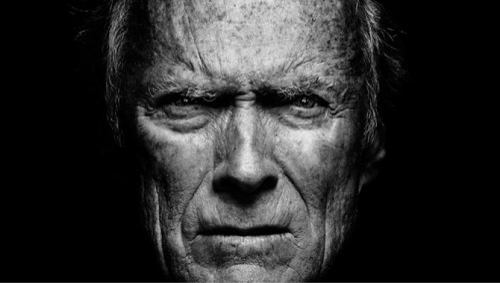

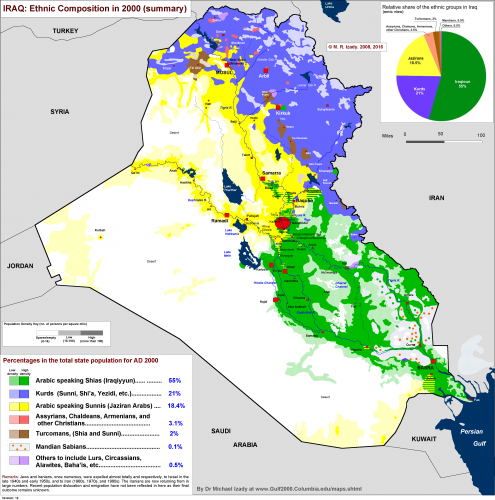

 Since 2003, Assyrians have been the targeted victims of the whole spectrum of atrocity. More than seventy churches across Iraq have been attacked or destroyed. Entire neighborhoods have been emptied of their residents following episodes of rape, murder, and intimidation deliberately fashioned to purge Iraq of Christianity. A pre-2003 population of around 1.2 million mainly ethnically Assyrian Christians in Iraq has dropped to four hundred thousand.
Since 2003, Assyrians have been the targeted victims of the whole spectrum of atrocity. More than seventy churches across Iraq have been attacked or destroyed. Entire neighborhoods have been emptied of their residents following episodes of rape, murder, and intimidation deliberately fashioned to purge Iraq of Christianity. A pre-2003 population of around 1.2 million mainly ethnically Assyrian Christians in Iraq has dropped to four hundred thousand.